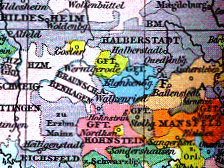County of Blankenburg
| County of Blankenburg (till 1707) Principality of Blankenburg (since) |
||||||||||
|
Grafschaft Blankenburg (till 1707) Fürstentum Blankenburg (since) |
||||||||||
| State of the Holy Roman Empire (until 1806) | ||||||||||
|
||||||||||
|
County of Blankenburg (blue) about 1400
|
||||||||||
| Capital | Blankenburg (Harz) | |||||||||
| Languages | Eastphalian | |||||||||
| Government | County | |||||||||
| Historical era | Modern history | |||||||||
| • | Partitioned from Saxony | 1123 | ||||||||
| • | To Prince-Bishop of Halberstadt | 1182 | ||||||||
| • | Joined Lower Saxon Circle | 1500 | ||||||||
| • | Enfeoffed to Brunswick-Lüneburg by Welf prince-bishop | 1599 | ||||||||
| • | Principality | 1707 | ||||||||
| • | Real union with Brunswick as Blankenburg district | 1815 | ||||||||
| • | East-West division | 22 July 1945 | ||||||||
|
||||||||||
The County of Blankenburg (German: Grafschaft Blankenburg) was a state of the Holy Roman Empire. Its capital was Blankenburg, it was located in and near the Harz mountains.
About 1123 Lothair of Supplinburg, then Duke of Saxony, had Blankenburg Castle erected in the Eastphalian Harzgau region. His liensman Poppo I of Blankenburg, a relative of Lothair's wife Richenza of Northeim, is documented as count over the Eastern Harzgau since 1128. He later also appeared as a ministerialis of the Welf duke Henry the Lion. After Poppo's death around 1161, his sons divided their heritage: Conrad took his residence at Regenstein Castle, 4 km (2.5 mi) north of Blankenburg, and became the ancestor of the noble House of Regenstein, while his brother Siegfried I retained Blankenburg Castle.
In 1180 Henry the Lion was deposed by an intervention of his Hohenstaufen cousin Emperor Frederick Barbarossa, allied with many Saxon vassals and former supporters of Duke Henry. However, the then ruling Counts of Blankenburg, Henry and Siegfried II, remained true liensmen of their liege lord, until Prince-Bishop Dietrich of Halberstadt, newly raised to Imperial immediacy by the emperor, besieged Blankenburg Castle and defeated them with his troops in 1182. After swearing allegiance to Dietrich, the brothers could maintain their county, their descendants laid out the Blankenburg settlement beneath the castle about 1200. The estates remained under suzerainty of the Halberstadt prince-bishops, strongly contested by the Welf dukes of Brunswick-Lüneburg.
...
Wikipedia


